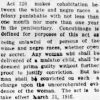calsfoundation@cals.org
Maudelle: A Novel Founded on Facts Gathered From Living Witnesses
Maudelle: A Novel Founded on Facts Gathered from Living Witnesses, written by James Henery Smith and published by Mayhew Publishing Company of Boston in 1906, is reputed to be the first novel written by an African American residing in Arkansas. Smith was a prominent Little Rock (Pulaski County) dentist, a leader in the black community who spoke in opposition of the proposed Separate Coach Act of 1891, and the father of Arkansas composer Florence Smith Price.
Maudelle is a novel about miscegenation, focusing on the “illicit commingling” between a U.S. Senator from Kentucky, George Morroe, and his slave Mary. Their child, Maudelle, becomes orphaned after a series of melodramatic events: the stabbing of Morroe; his deathbed request to be married to her mother, which is refused by a local white minister; and Morroe’s own defiant self-declared marriage. The key act is Morroe’s deathbed dictation of a will freeing his 165 slaves and assigning all of his stocks, bonds, and cash assets of $300,000 to Mary and Maudelle. After the kidnapping of the child, the mother dies of heart failure. Maudelle then suffers “efforts made to dispossess the child of her property,” and “only after years of litigation [is] the property awarded to her by the courts.”
The novel itself is hard to come by, with non-circulating hard copies only in the Library of Congress and the Ohio State University library, along with a photocopy in Special Collections of Mullins Library at the University of Arkansas (UA) in Fayetteville (Washington County). Several university libraries have microfilm copies.
For additional information:
Gatewood, Willard B. Aristocrats of Color: The Black Elite, 1880–1920. Bloomington: Indiana University Press, 1990.
Preston, Izola, and Gordon D. Morgan. “James Henry Smith, 1843–1914.” Pulaski County Historical Review 53 (Winter 2005): 121–123.
Smith, James Henery. Maudelle: A Novel Founded on Facts Gathered from Living Witnesses. Boston: Mayhew Publishing Company, 1906.
Linda Lovell
Northwest Arkansas Community College
 Anti-miscegenation Laws
Anti-miscegenation Laws Early Twentieth Century, 1901 through 1940
Early Twentieth Century, 1901 through 1940 Literature and Authors
Literature and Authors Maudelle Cover
Maudelle Cover 




Comments
No comments on this entry yet.